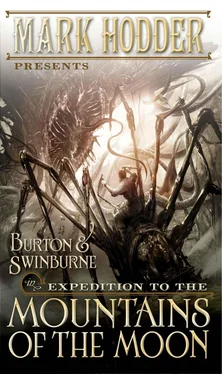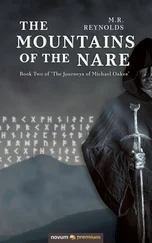Mark Hodder - Expedition to the Mountains of the Moon
Здесь есть возможность читать онлайн «Mark Hodder - Expedition to the Mountains of the Moon» весь текст электронной книги совершенно бесплатно (целиком полную версию без сокращений). В некоторых случаях можно слушать аудио, скачать через торрент в формате fb2 и присутствует краткое содержание. Жанр: sf_stimpank, на английском языке. Описание произведения, (предисловие) а так же отзывы посетителей доступны на портале библиотеки ЛибКат.
- Название:Expedition to the Mountains of the Moon
- Автор:
- Жанр:
- Год:неизвестен
- ISBN:нет данных
- Рейтинг книги:5 / 5. Голосов: 1
-
Избранное:Добавить в избранное
- Отзывы:
-
Ваша оценка:
- 100
- 1
- 2
- 3
- 4
- 5
Expedition to the Mountains of the Moon: краткое содержание, описание и аннотация
Предлагаем к чтению аннотацию, описание, краткое содержание или предисловие (зависит от того, что написал сам автор книги «Expedition to the Mountains of the Moon»). Если вы не нашли необходимую информацию о книге — напишите в комментариях, мы постараемся отыскать её.
Expedition to the Mountains of the Moon — читать онлайн бесплатно полную книгу (весь текст) целиком
Ниже представлен текст книги, разбитый по страницам. Система сохранения места последней прочитанной страницы, позволяет с удобством читать онлайн бесплатно книгу «Expedition to the Mountains of the Moon», без необходимости каждый раз заново искать на чём Вы остановились. Поставьте закладку, и сможете в любой момент перейти на страницу, на которой закончили чтение.
Интервал:
Закладка:
It was past eleven o'clock by the time he finally arrived at 14 Montagu Place. As he stepped in, Mrs. Angell greeted him.
“Hallo!” he said, slipping his cane into an elephant's-foot holder by the door. “Good show! You got home! What a state the streets are in!”
“It's pandemonium, Sir Richard,” she agreed. “How are the delivery boys to do their job? We'll starve!”
“I'm halfway there already,” he said, shrugging out of his coat and hanging it on the stand. “I haven't eaten since I don't know when!”
“Then you'll be pleased to hear that a bacon and egg pie has been waiting for you these three hours past. That should fill the hole in your stomach. I don't know what to do about the hole that appears to have found its way into your hat, though.”
Burton took off his topper and eyed it ruefully. “Oh well, I don't suppose I'll need it where I'm going. Perhaps you'd consign it to the dustbin for me?”
“Most certainly not!” the old woman objected. “A fine headpiece like that should be repaired, not abandoned. What happened to it?”
“Someone took a pot-shot at me.”
Mrs. Angell raised her hands to her face. “Oh my goodness! With a gun? Are you hurt?”
Burton placed the hat on the stand, then squatted to untie his bootlaces.
“Not at all. The would-be assassin's aim was off.”
He eased his boots off and stood in his stockinged feet.
“I missed a night's sleep and I'm weary to the bone,” he said. “I'll change into something more comfortable and join you in the kitchen for supper, if you don't mind.”
Mrs. Angell looked surprised. “Eat? In the kitchen? With me?”
Burton took his housekeeper by the shoulders and smiled fondly down at her. “My dear, dear woman,” he said. “I shan't see you again for such a long time. How will I ever do without you? You've fed me and cleaned up after me; you've kept me on the straight and narrow when I would have strayed; you've put up with intruders and all manner of inconveniences; you didn't even complain when the Tichborne Claimant practically demolished the house. You are one of the world's wonders, and I'd be honoured to dine with you tonight.”
With glistening eyes, Mrs. Angell said, “Then be my guest, Sir Richard. There is, however, a condition.”
“A condition? What?”
“I shall boil plenty of water while we eat and, when we are finished, you'll carry it upstairs and take a bath. You reek of the Thames, sir.”
Burton relaxed in a tin bathtub in front of the fireplace in his study. He'd shaved, clipped his drooping moustache, and scrubbed the soot and toxins from his skin.
He took a final puff at the stub of a pungent cheroot, cast it into the hearth, reached down to the floor and lifted a glass of brandy to his lips, drained it, then set it back down.
“Someone,” he said to the room, “doesn't want me to go to Africa, that much is plain.”
“Fuddle-witted ninny,” murmured Pox, his messenger parakeet. The colourful bird was sleeping on a perch near a bookcase. Like all of her kind, she delivered insults even while unconscious.
Burton leaned back, rested his head on the lip of the tub, and turned it so that he might gaze into the flickering flames of the fire.
His eyelids felt heavy.
He closed them.
His breathing slowed and deepened.
His thoughts meandered.
In his mind's eye, faces formed and faded: Lieutenant William Stroyan, Sir Roderick Murchison, Ebenezer Smike, Thomas Honesty, Edwin Brundleweed. They shifted and blended. They congealed into a single countenance, gaunt and lined, with a blade-like nose, tight lips, and insane, pain-filled eyes.
Spring Heeled Jack.
Gradually, the features grew smoother. The eyes became calmer. A younger man emerged from the terrible face.
“Oxford,” Burton muttered in his sleep. “His name is Edward Oxford.”
His name is Edward Oxford.
He is twenty-five years old and he's a genius-a physician, an engineer, a historian, and a philosopher.
He sits at a desk constructed from glass but, rather than being clear, it is somehow filled with writing and diagrams and pictures that move and wink and come and go. The surface of the desk is flat and thin, yet the information dancing within it-and Burton instinctively knows that it is information-appears to be three-dimensional. It's disconcerting, as if something impossibly big has been stored in something very small-like a djan in a lamp-but this doesn't appear to bother Oxford. In fact, the young man has some sort of control over the material, for occasionally he touches a finger to the glass or he murmurs something and the writing and outlines and images respond by folding or flipping or metamorphosing.
A large black diamond has been placed on the desk.
Burton recognises it as the South American Eye of Naga, which he'd discovered last year beneath the Tichborne family's estate. The dream disagrees with him. The stone was not found in 1862, it says. It was found in 2068.
Original history!
Oxford is fascinated by it. The structure of the stone is unique. He whispers, “Even more sensitive than a CellComp. More efficient than a ClusterComp. More capacity than GenMem.”
What is he talking about? Burton wonders.
The dream twists away and repositions itself inside a day a few weeks later.
The diamond is filled with the remnant intelligences of a prehistoric race. They have inveigled their way into Oxford's mind.
He starts to think about time.
He becomes obsessed.
He becomes paranoid.
It happens that he shares his name with a distant ancestor who, in a fit of insanity, had attempted to assassinate Queen Victoria. A voice, from somewhere behind his conscious mind, insists: “That man besmirched your family's reputation. Change it. Correct it.”
Why does this obscure fact suddenly matter? Why should he care about a forgotten incident that occurred near three hundred and fifty years ago?
It matters.
He cares.
He can think about little else.
The reptilian intelligence plants another seed.
Slowly, in Oxford's mind, a theory concerning the nature of time blossoms like a pervasively scented exotic flower. Its roots dig deeper. Its lianas entangle him. It consumes him.
He works tirelessly.
The dream convulses and fifteen years have passed.
Oxford has cut shards from the diamond and connected them to a chain of DNA-StringComps and BioProcs. They form the heart of what he calls a Nimtz Generator. It is a flat circular device. It will enable him to move through time.
To power it, he's invented the fish-scale battery, and has fashioned thousands of these tiny solar-energy collectors into a one-piece tight-fitting suit. He's also embedded an AugCom into a round black helmet. It will act as an interface between his brain and the generator. It will also protect him from the deep psychological shock that he somehow knows will afflict anyone who steps too far out of their native time period.
The boots of the costume are fitted with two-foot-high spring-loaded stilts. They appear wildly eccentric but they offer a simple solution to a complex problem, for when the bubble of energy generated by the Nimtz forms around the suit, it must touch nothing but air.
Oxford will literally jump through time.
It is the evening of 15th February, 2202. Nine o'clock. A Monday. His fortieth birthday.
Oxford dresses in attire suitable for the 1840s. He pulls his time suit on over the top of it and clips on his stilts. He attaches the Nimtz Generator to his chest and puts the helmet on his head. He picks up a top hat and strides out of his workshop and into the long garden beyond.
His wife comes out of the house, wiping her hands on a towel.
Читать дальшеИнтервал:
Закладка:
Похожие книги на «Expedition to the Mountains of the Moon»
Представляем Вашему вниманию похожие книги на «Expedition to the Mountains of the Moon» списком для выбора. Мы отобрали схожую по названию и смыслу литературу в надежде предоставить читателям больше вариантов отыскать новые, интересные, ещё непрочитанные произведения.
Обсуждение, отзывы о книге «Expedition to the Mountains of the Moon» и просто собственные мнения читателей. Оставьте ваши комментарии, напишите, что Вы думаете о произведении, его смысле или главных героях. Укажите что конкретно понравилось, а что нет, и почему Вы так считаете.












